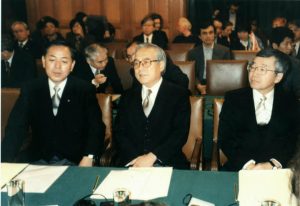Striving to fill voids in Hiroshima, unfinished judgment, Part 14: Mayor/former journalist
May 6, 2024
Stressed “illegality” on basis of reporting
In 1967, four years after a verdict was rendered in the 1963 “A-bomb trial,” the Chugoku Shimbun published a series of articles reporting on the trial’s significance and problems. It was part of a project titled “Blood of Japan” with a focus on the modern history of Japan’s Chugoku Region, which tracked the trial from the time it was proposed by Shoichi Okamoto until the time a decision was rendered.
“Moved by pursuit of U.S. responsibility”
Takashi Hiraoka, 96, a resident of Hiroshima’s Nishi Ward who did the reporting for the series as a senior staff writer at the Chugoku Shimbun, said with conviction, “I was moved by Mr. Okamoto’s determination to pursue the responsibility of the United States, as the A-bomb survivors had been abandoned by the Japanese government.” Mr. Hiraoka added, “The origin of my obstinate attention to the United States’ responsibility for the atomic bombings lies there.”
Mr. Hiraoka also interviewed Toshimasa Koseki, a judge at the Tokyo District Court who read the court’s expert testimonies and handed down the verdict stating that the “atomic bombings of Hiroshima and Nagasaki were a violation of international law.” At the end of the series, Mr. Hiraoka pointed out that “reexamining the meaning of the ‘A-bomb trial’ would be extremely important work for making progress in the campaign against atomic and hydrogen bombs and in the movement to provide aid and relief to the A-bomb survivors.”
In 1995, 28 years later, Mr. Hiraoka, who was then serving as mayor of Hiroshima City, had an opportunity to make a statement as the leader of the A-bombed city in a court that deliberated on the issue of whether or not the threat or use of nuclear weapons was legal. Hearings were held by the International Court of Justice (ICJ; in The Hague, the Netherlands), the major legal branch of the United Nations.
The hearings were sparked by the World Court Project, initiated by a group of lawyers and physicians with the aim of the abolition of nuclear weapons. Yasuhiro Matsui, the attorney for the plaintiffs in the A-bomb trial, was also involved in the project.
Unlike the A-bomb trial, which dealt with the actual cases of the use of atomic bombs, in this instance, the question was limited to how international law viewed the threat or use of nuclear weapons. In the statements before the court made by participating nations, Japan’s government, which seeks protection from the U.S. nuclear umbrella, again failed to explicitly state that the threat or use of atomic bombs would be “a violation of international law.”
Two principles followed in ICJ
For his part, Mr. Hiraoka said, “My experience from covering the A-bomb trial formed the basis of my own statement.” Using the ruling of the A-bomb trial that rendered the atomic bombings illegal based on the two principles of the indiscriminate nature of the damage and the cruelty of radiation that inflicted “unnecessary suffering” as the basis for the logical structure of his statement, Mr. Hiraoka made the following appeal.
“The atomic bomb was responsible for the indiscriminate mass murder of civilians and for keeping human beings suffer from radiation damage to this day. It is clear that the use of nuclear weapons is contrary to international law.”
Iccho Ito, mayor of Nagasaki City at the time, made a statement from the same standpoint. However, Japan’s government distanced itself from the statements of the two mayors, saying “they are independent of the government’s stance.” An advisory opinion handed down the following year by the ICJ judged that the threat or use of nuclear weapons would “generally be contrary to the rules of international law.” The general framework of the reasoning for that judgment was based on the same two principles.
The ICJ opinion increased the momentum for establishing the Treaty on the Prohibition of Nuclear Weapons (TPNW), which completely bans all nuclear weapons. The TPNW was adopted in 2017 with the support of 122 nations and regions.
The A-bomb trial was one of the origins of the TPNW, the long-cherished wish of many A-bomb survivors and citizens of the A-bombed Hiroshima, where the leaders of various countries, including nuclear weapons states, gathered in May 2023.
Keywords
ICJ advisory opinion about threat or use of nuclear weapons
The International Court of Justice is one of the major branches of the United Nations and can provide advisory opinions on international legal issues. The threat or use of nuclear weapons was reviewed at the request of the UN General Assembly, and in 1996, the ICJ provided an advisory opinion stating that the “threat or use of nuclear weapons is generally contrary to the rules of international law.” On the other hand, the ICJ stated that it “cannot conclude definitively whether the threat or use of nuclear weapons would be lawful or unlawful in an extreme circumstance of self-defense, in which the very survival of a State would be at stake.”
(Originally published on May 6, 2024)








